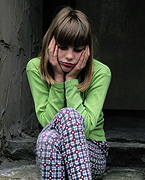
WEDNESDAY, Dec. 21 (HealthDay News) — The holidays can be a particularly difficult time for people suffering from depression.
Experts from Gottlieb Memorial Hospital, part of the Loyola University Health System, said they are bracing for an increase in self-destructive behavior. They noted however, there are ways to recognize when a person is depressed and intervene before they end up in the emergency room.
“For those who have no support system, no friends, family, loved ones or even co-workers, the holidays can prove very deadly,” Dr. Mark DeSilva, medical director of the emergency department at Gottlieb Memorial Hospital, said in a hospital news release. “Everywhere, there are signs of gatherings, gift exchanges, happiness and love. If you are not experiencing what the rest of the world is enjoying, it is very bitter.”
Although the holidays can bring out desperate acts in unstable people, he pointed out that there are usually a number of warning signs leading up to this behavior. DeSilva offered the following tips to help identify these red flags:
- Being antisocial. “Most people are busy going to social gatherings, shopping, attending events and connecting with friends,” DeSilva said. “Look for those who shun social interaction or who consistently do not attend events that they say they will.”
- Being angry.“The person expresses sarcasm, unhappiness or criticism of others’ joy in the season and is consistently pessimistic,” DeSilva said.
- Abusing drugs or alcohol. “Beer or cocktails, readily available throughout the holidays, or illegal drugs, are overindulged to numb the pain the individual is feeling and offer an escape from reality,” DeSilva explained.
- Missing work or other events. “Facing others who are happy and bright is often too difficult for those feeling the holiday blues,” DeSilva said. “They may be consistently absent or very late to work or no-shows at anticipated social engagements.”
- Excessive sleepiness. “Depression often takes the guise of extreme fatigue or tiredness. The body shuts down to form an escape from the everyday world,” DeSilva cautioned.
Anyone who recognizes these behaviors in a friend or acquaintance should reach out to that person right away, particularly if they’ve been hit hard by the economic downturn.
“By recognizing when a person is in trouble, and speaking out, you may not only save them a trip to the [emergency department], but also save a life,” DeSilva concluded.
More information
The U.S. National Institute of Mental Health provides more information on depression.

